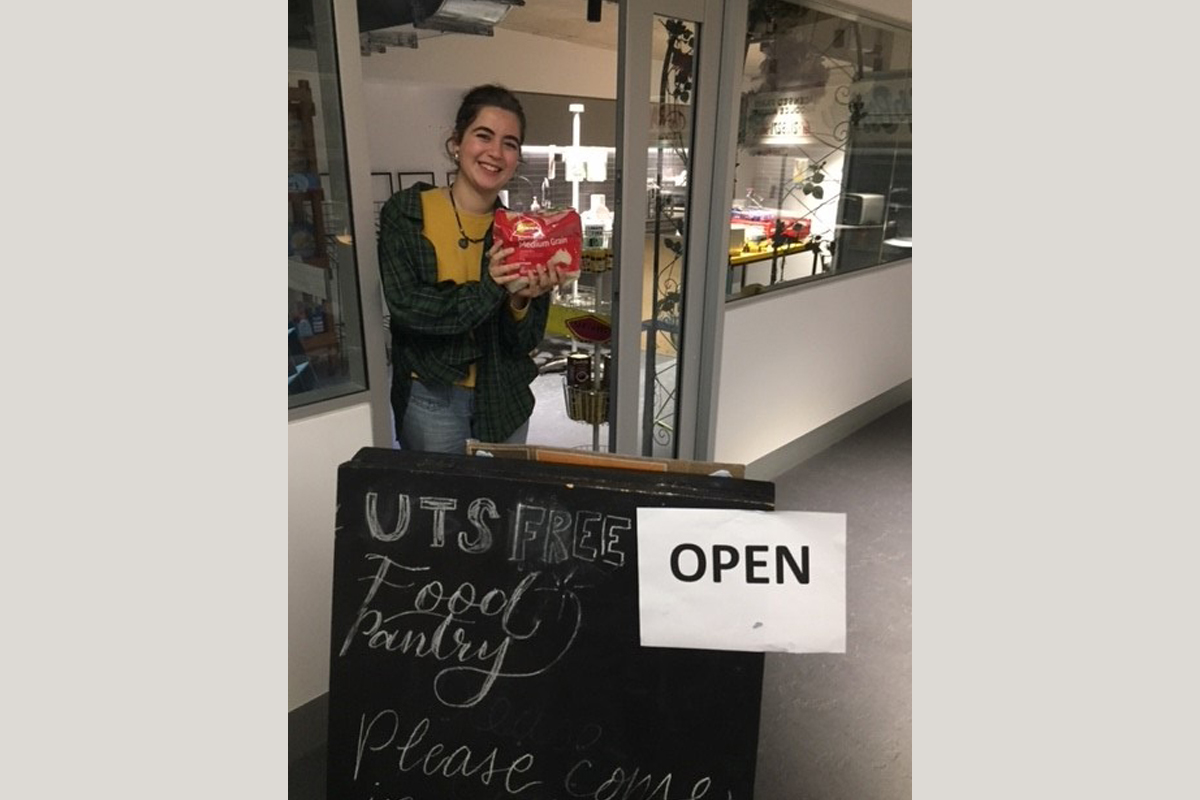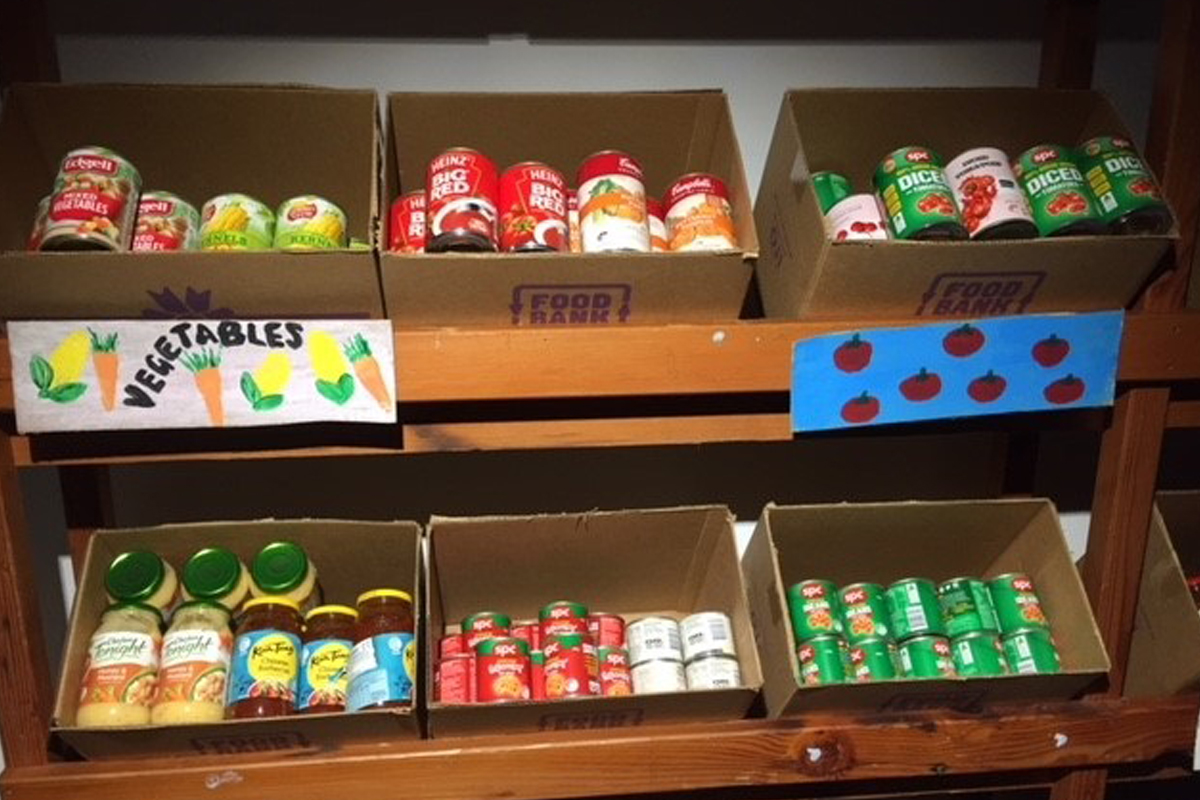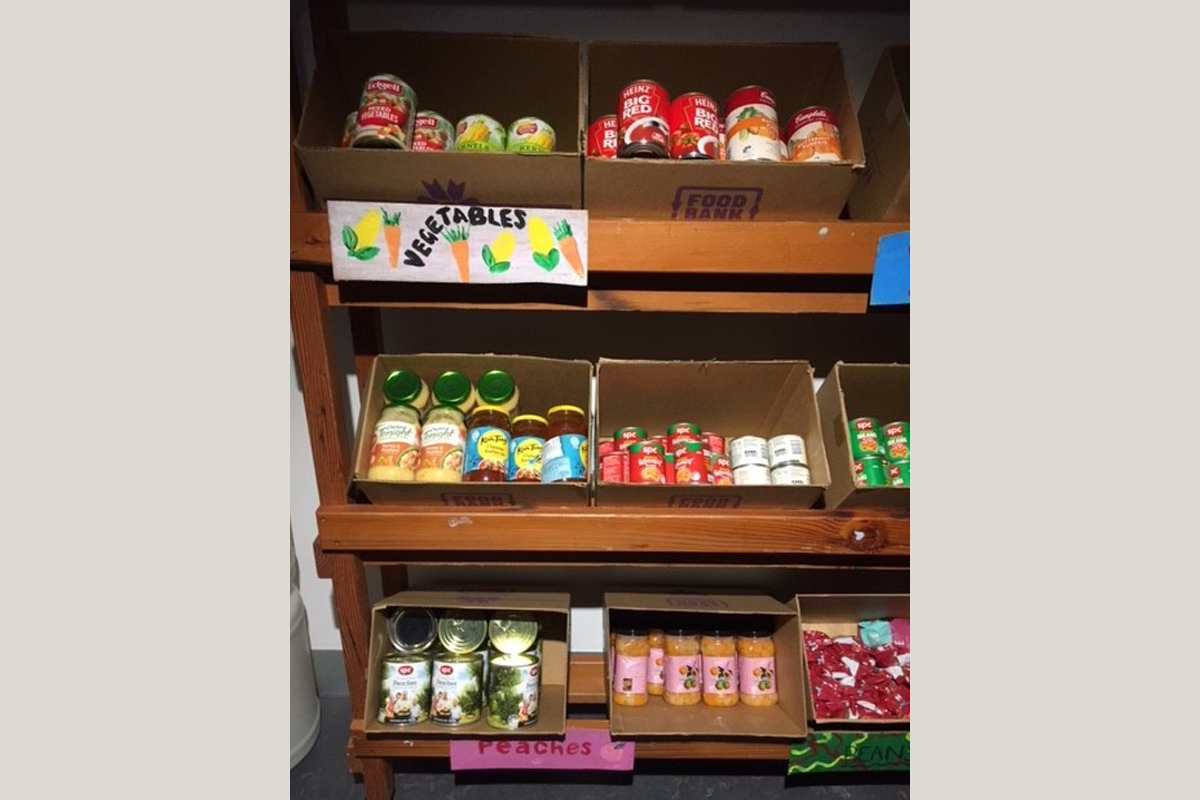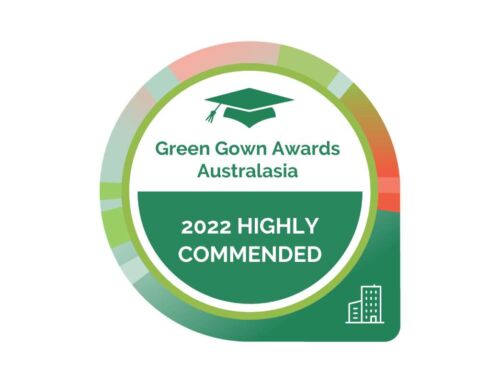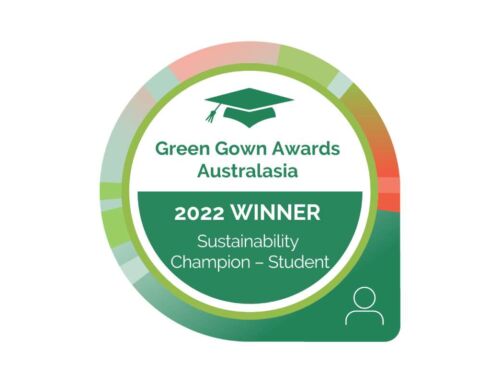University of Technology Sydney
Anna Thieben is the 2022 President of the UTS Student’s Association (UTSSA). She has been very active in the UTS student environment community over 3 years and most recently played a pivotal role in helping to establish a student pantry providing free essential pantry items to students in temporary financial stress following the COVID pandemic. The initiative builds on the work of the Students’ Association over more than a decade providing free nutritious, sustainable breakfasts and noodle dinners through the pop-up Bluebird Brekkie Bar and Night Owl Noodle Bar.
> A closer look
Anna is the 2022 President of the UTS Students’ Association (UTSSA). In 2021 she was co-convenor of the SA’s Enviro Collective and in 2020 their Environment Officer. Over three years at UTS she has been actively involved in the student environment community . This year, in her role of President, her key priorities are making the SA more accessible to the average student by making the SA more welcoming and creating new ways for students to participate and engage. A manifestation of this is the newly established free student Bluebird and Night Owl Pantry. Other ongoing SA campaigns include: fossil fuel divestment (while UTS has committed to divest the SA is monitoring the situation and liaising with management until the process is completed); action on quality education (resisting staff cuts); examining university/corporate partnerships, and advocating for improvements to the ‘Respect Now Always’ campaign on campus.
Over ten years ago the UTSSA established and continues to run the Bluebird Brekkie Bar, a pop-up café providing free healthy breakfasts for students. The initiative won an Australasian Green Gown Award (student initiatives category) in 2012, and the International Green Gown Award in 2013. In 2016 the UTSSA expanded the initiative by creating the Night Owl Noodle Bar, providing free noodle soups to students two evenings per week. Prior to the COVID pandemic Bluebird and Night Owl were providing over 4000 free meals to students per week. Post COVID, as the students transition back to campus they are providing approximately 3000 meals per week.
The COVID pandemic had a massive financial impact on students, especially International students, many of whom relied on part-time and casual work to survive. Most students lost income in 2020 and 2021 and the UTS Students’ Association saw first hand the struggles being faced by some students to survive. They identified a need in the student body for essential pantry items to help students through acute periods of financial stress. And so the idea for a free student pantry was born.
In her role of President, Anna Thieben helped identify the need for items beyond hot meals to other key household items such as hygiene products and laundry soap. Anna initiated the new Bluebird and Night Owl Pantry. But she didn’t do it alone, she brought together, and guided a keen group of students to develop and implement the initiative.
Firstly, they needed a suitable location on campus and sadly the UTS Co-op had become unviable during the COVID lockdowns and had closed. The small shop front used by the Co-op was in a central location near the main Food Court on Campus (in the UTS Central Building) and was available. Anna contacted UTS Commercial who administered the space and confirmed the space was available. Next she reached out to key stakeholders across the university to build a network of supporters – UTS Sustainability, Space Planning, UTS Housing, and Central Services. With support from these stakeholders, she then approached the key decision maker – the Deputy Vice Chancellor (Students and Education). She secured senior executive support and the project was to become a reality.
Next the team of organising students, led by Anna, had a rolling series of meetings to work out logistics and operational issues. They organised working bees to clean out the space, and re-purposed some of the internal shelving and equipment from the old Co-op that was well suited to a new life in the Bluebird and Night Owl Pantry.
They sourced donated non-perishable food and other basic household items to stock the space and on 6 May 2022 the Bluebird and Night Owl Pantry opened, providing free pantry items to students in need.
> Impact and benefits
The new Bluebird and Night Owl Pantry meets a critical need in the UTS student body – helping individuals who are experiencing temporary financial hardship and struggling to secure basic food and household items. The Pantry provides these items free of charge to UTS students. Items available include rice and pasta; breakfast cereal; tinned vegetables; dried beans; tea and coffee; long-life milk; laundry powder and hygiene/sanitary products. Everything is free.
There is no limit on the amount an individual can have, they are simply invited to take what they need. In the first three (3) weeks of operation 300 students visited the Pantry to collect essential items.
The response from patrons visiting the Pantry has been interesting on a few levels. The first response is one of surprise and gratitude – how can these things be free? How is this even possible? Most students are fascinated and interested in the story of how the Pantry came about and how it operates. Questions and conversations invariably flow. All students have been quite humble and modest in what they receive from the Pantry. Some are mildly embarrassed. So far, no-one has gamed the system or taken more than they need. On the contrary, most visitors need to be encouraged to take more!
The Pantry is largely a welfare initiative, designed to meet the basic welfare requirement of students who find themselves in an acute situation. Importantly, it’s about students helping students. The Pantry is staffed mostly by volunteer students, (and occasionally paid staff from the SA). This means when students visit the Pantry they engage with peers – fellow students. Anecdotal evidence suggests this has been an additional significant benefit of the project, providing a space for social connection and helping to break down social stigma and isolation that can come from financial stress. Building on these social benefits, the plan for next semester is to run a series of workshops on cooking, food preparation and other fun household-focused themes such as soap making, bees wax wrap making, herb gardening, etc.
In addition to the social sustainability benefits, the project’s other main benefit has been utilising donated food and items destined for landfill. So far all items stocked by the Pantry have been donated. A significant volume of tinned and dried food was left over from a NSW Government program providing food hampers during the pandemic. Other items have been donated by individual companies. The SA has initiated an ongoing relationship with Food Bank to provide some items, and campus cafes and food retailers have agreed to provide food not sold at the end of each day. Next semester the Pantry plans to include fresh herbs, inviting staff who may be able to donate them from their own garden. One staff member active in the nearby Angel St community garden has arranged to drop off fresh herbs from the community garden each Monday morning.
The furniture, shelving and all utensils are re-used or recycled.
Surprisingly, the initiative has involved very little financial input. The space itself has been donated free of charge by the university on a 12-month trial basis. The previous tenant had become unviable and the space was no longer generating revenue. The benefit for the university has been to activate the space and help re-engage students on campus.
While the key impact has been the welfare benefit of students, the project has also generated sustainability benefits by re-using and re-purposing furniture and pantry items destined to become waste.
> Leadership and engagement
Anna was the key person who initiated the idea of the Bluebird and Night Owl Pantry, and who facilitated the group of students who worked on the initiative to make it a reality. When the initiative was barely the seed of an idea she reached out to other key parts of the Students’ Association to get their input and generate interest – the Welfare Collective, as well as the Enviro, Disabilities, Ethnocultural, and Indigenous Collectives. From this, a core working group of approximately a dozen students was formed who met regularly to work through the steps of establishing the Pantry. Working bees with other student volunteers cleaned out the shop space and reconditioned it for a new life. Signage and posters were created, including digital materials to promote the Pantry on social media channels.
Since opening in May the Bluebird and Night Owl Pantry has been staffed by volunteer students, with gaps in the roster filled by paid staff from the SA. Most of these staff are also students themselves. A couple of students who first visited the pantry as patrons have since gone on to volunteer in the space – demonstrating the social and community-building benefits of the initiative.
The Pantry is open for a few hours in the middle of each weekday during the semester – the time when the greatest number of students are on campus.
While the initiative has been very low cost financially, the main input has been logistics, organisation and administration. The Students’ Association and volunteer students have provided all of this, which has been facilitated and guided by Anna’s cheerful, inspiring and very competent leadership.
Establishing a successful new initiative is never easy, especially at this time when the tertiary education sector has been bruised and diminished by the pandemic. Despite this, Anna and her group of students at the UTSSA, have shown how it can be done! An inspiring example of student leadership – an initiative by students, for students.
> Wider societal impact
Like so many welfare initiatives in wealthy countries such as Australia, the obvious question is why on Earth is a student pantry even necessary?
Sydney is an expensive city and many students struggled financially even before COVID. The pandemic simply exposed the dark underbelly of exploitation of casual and gig economy workers, especially of international students. In response to the appalling way these students were treated by the Australian Government during lockdowns, the pandemic has triggered questions within many universities about the ethics of charging international students exorbitant fees whilst many live in poverty. Is it ethical?
The overwhelming demand from students for the Bluebird Brekkie Bar, Night Owl Noodle Bar, and now the Bluebird and Night Owl Pantry shows that there is a desperate need from students for basic healthy food. Why can’t universities play a more active role in helping provide this basic need?
The UTS Students’ Association is leading the way in providing free meals and emergency pantry items to students. But they should not be doing it alone. The idea could have deeper traction within all institutions, supported by university managements, to play a more active role in ensuring their own students are not living in poverty.

